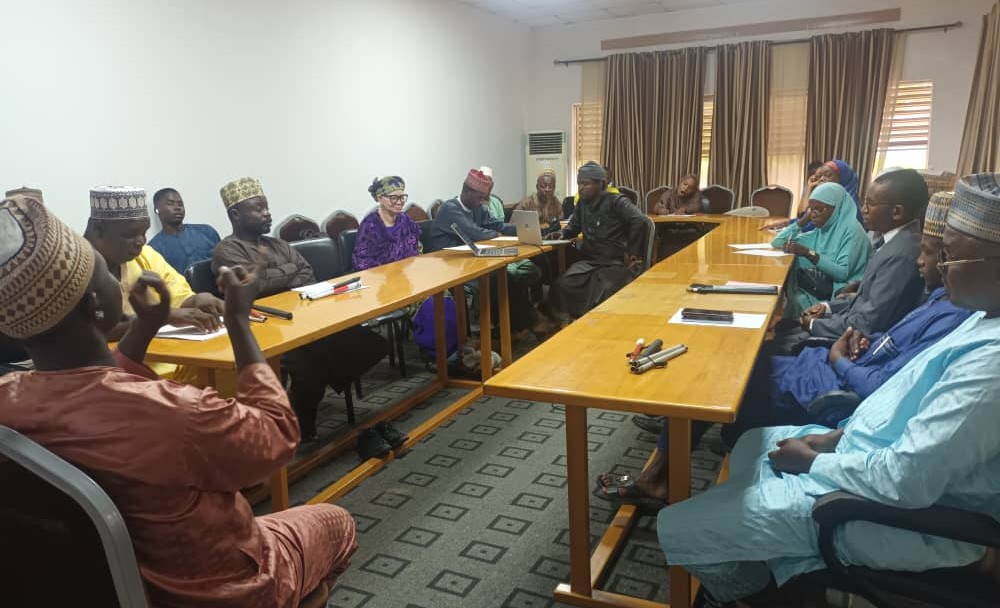A communiqué has been developed following a one-day stakeholders’ forum addressing the challenges faced by people with disabilities in writing the Unified Tertiary Matriculation Examination (UTME). The forum, organized by the Centre for Information Technology and Development (CITAD) in partnership with the Aminu Kano Centre for Democratic Research and Training, took place on the 21st of July, 2024, at Mambayya House.
Attendees included representatives from associations of people with disabilities, such as those with hearing and vision impairments, physical challenges, albinism, and spinal cord injuries. Key participants included Nura Iro Ma’aji, Senior Special Advisor to the Kano State Governor on Students Matters; Yusuf Ibrahim Sharada, Senior Special Advisor on ICT; Professor Yahuza Bello, Coordinator of the JAMB Equal Opportunity Group (JEOG); and representatives from the Aminu Kano College of Islamic and Legal Studies.
The forum aimed to discuss the specific challenges faced by people with disabilities in registering for and writing the UTME examination, explore potential solutions, and foster collaboration among stakeholders to create a more inclusive examination process.
Several observations were made during the forum:
The Joint Admission and Matriculation Board (JAMB) prioritizes candidates with vision impairments, neglecting other disability groups. There is a lack of a comprehensive national database of people with disabilities (PWDs) eligible for JAMB exams. Over 80% of visually impaired individuals lack computer knowledge.
There are inadequate standardized accessibility features for computer-based exams for visually impaired candidates. Insufficient funding and allocation of resources remain significant challenges. Many of the braille machines used by JAMB are outdated and ineffective. There is a shortage of trained scribes to assist with reading and writing. Examination halls lack accessible features such as ramps and elevators. The albino community raised concerns about inadequate lighting, affecting their performance during exams.
There is a lack of magnifying glasses for albino candidates. There are no sign language interpreters available during exams. JAMB centers lack ramps, elevators, and accessible public conveniences for physically challenged individuals. JAMB provides certain accommodations such as writing slates, braille papers, and financial support for visually impaired candidates.
Based on these observations, the forum proposed several recommendations to ensure an inclusive education system:
JAMB should organize a national stakeholders meeting with representatives of people with disabilities to discuss and address their challenges. JAMB should collaborate with technology-oriented organizations to provide training and equipment for people with disabilities, especially those with vision impairments.
State governments should organize comprehensive training programs for JAMB and exam center staff to support visually impaired candidates. JAMB should assess exam centers to identify and address physical and environmental barriers for people with disabilities. State governments should ensure adequate accommodation, transport, and feeding for all people with disabilities.
JAMB should provide sign-language interpreters in all exam centers for hearing-impaired candidates. Magnifying glasses should be available for albino candidates in all UTME centers. Trained scribes should be stationed at all centers to assist candidates with disabilities.
JAMB should provide UTME examination front pages with students’ details. Keyboards should be simplified (A, B, C, D, E) for visually impaired candidates. The Kano State government was urged to provide more ICT personnel and equipment at the Special Education School in Tudun Maliki.
The stakeholders emphasized that the Computer-Based Test is now a permanent fixture in Nigeria and will soon be mandatory for persons with disabilities (PWDs). Therefore, all PWD clusters, state governments, and organizations supporting PWDs should intensify efforts to raise awareness about the importance of learning computer skills in preparation for the examinations.
The communiqué was signed by Ibrahim Umar Abdulkharim, Chairman of the Education Committee of the Nigerian Association of the Blind (NAB); Engr. Abdul D. Haruna, Pioneer and Former Chairman of the Spinal Cord Injury Association of Nigeria, Kano State Chapter, and Secretary of the Coalition of the Disables Self Advocacy Network Group (CDSANG); Muhammad Sani Jumada, ICT Tutor at the Kano State Association of Deaf; Hajiya Mariya Ishaka, Chairperson of The Albino Foundation, Kano; and Hamza Aminu Fagge, PWDs Coordinator at CITAD.
